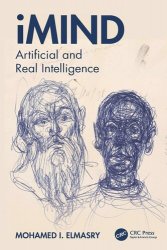iMind: Artificial and Real Intelligence
- Добавил: literator
- Дата: 10-07-2024, 06:40
- Комментариев: 0
 Название: iMind: Artificial and Real Intelligence
Название: iMind: Artificial and Real IntelligenceАвтор: Mohamed I. Elmasry
Издательство: CRC Press
Год: 2025
Страниц: 207
Язык: английский
Формат: pdf (true), epub
Размер: 10.1 MB
Why has so much of our recent attention been focused on Artificial Intelligence (AI) while Real Intelligence (RI) is all but forgotten? And why are we spending so much energy debating the future of AI rather than that of its human original? Why can’t those who are concerned about AI and those who care about RI talk to one another using a common language?
iMind: Artificial and Real Intelligence is the first comprehensive popular science account of AI and RI. Unique in scope, it discusses the interdisciplinary science of AI, RI, smartphones, smart sensors, microchips, and the brain-mind connection. It explores what is beyond the physical, including mindfulness and spirituality, and how they can impact our wellbeing in the here and now, and how they can help us achieve a healthy and fulfilling old age.
iMind: Artificial and Real Intelligence, the latest book by renowned engineer and academic professor, Mohamed Elmasry, is a fascinating examination of the role Artificial Intelligence (AI) plays in our modern world, and its impact on our present and future lives. Despite the fact that AI has been part of our technological landscape for decades, it’s safe to say that until recently most non-technically inclined individuals like myself did not fully grasp the extent to which it had infiltrated our lives and how seamlessly it has been integrated into various aspects of everyday activities. When I use a search engine such as Google, AI is there, attempting to understand my needs and deliver results that are most relevant to my query. AI is revolutionizing the fields of healthcare and medicine. Already it can analyze X-rays and MRIs many times faster and often more accurately than humans, allowing quicker and more reliable diagnoses. But for all the ways in which AI has made our lives simpler and more efficient, for many it has created a high degree of anxiety. This anxiety is largely grounded in ignorance—a lack of understanding about what AI is, how it works and where it is headed. While we don’t need to be experts to use AI, there is an underlying sense of unease about a tool so powerful, that its operation seems shrouded in mystery. This is where Professor Elmasry’s book is so timely and informative. Designed to engage a diverse audience—including general readers curious about the basic scientific principles on which AI is based— iMind: Artificial and Real Intelligence explains in everyday language some of the fundamental concepts at the core of AI; from physical hardware like microchips, to applications like Machine Learning and other tools used for building, training, and operating AI systems.
But iMind also emphasizes that the development of artificial neural networks at the heart of AI has depended heavily on an understanding of how the human brain works. In teaching computers how to think, speak and reason approximately like us, we need to remember that the human brain is infinitely more complex than the most sophisticated computer. This is what Professor Elmasry calls Real Intelligence (RI).
The development of RI begins in utero, and can be considered comparable to establishing the hardware set-up on a smartphone. Just as a smartphone is assembled by combining individual hardware components, and relies on the integration of various parts, the human brain develops by assembling neurons and forming intricate neural networks. And just as a smartphone receives its Operating System in the factory, human brains receive their basic operating instructions in the womb.
Where RI deviates from AI is made clear in Professor Elmasry’s book. The functioning and efficiency of human neural networks throughout our lives—even their very survival—depend heavily on multiple external inputs, including such basics as adequate nutrition. After birth, throughout childhood, and continuing into adulthood and old age, sensory experiences help build and maintain our neural connections, enhancing learning and cognition.
Скачать iMind: Artificial and Real Intelligence
[related-news] [/related-news]
Внимание
Уважаемый посетитель, Вы зашли на сайт как незарегистрированный пользователь.
Мы рекомендуем Вам зарегистрироваться либо войти на сайт под своим именем.
Уважаемый посетитель, Вы зашли на сайт как незарегистрированный пользователь.
Мы рекомендуем Вам зарегистрироваться либо войти на сайт под своим именем.
